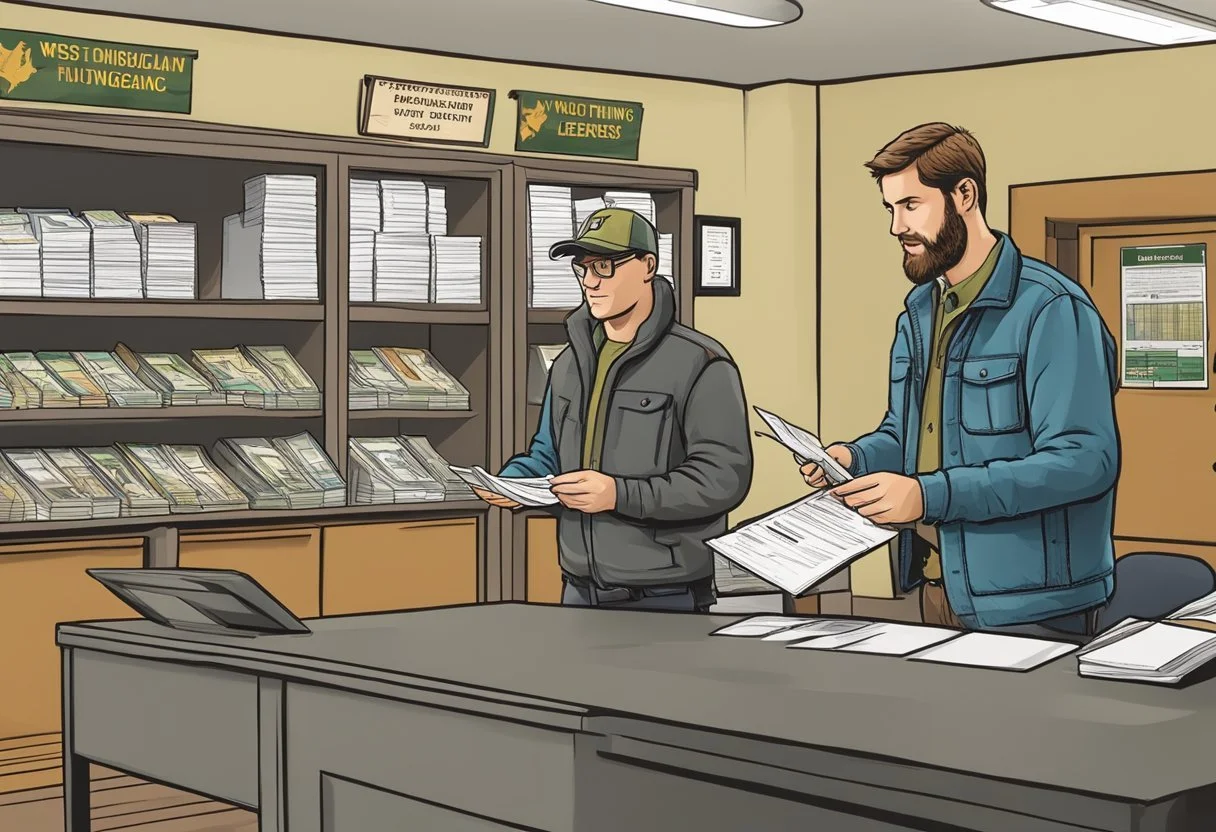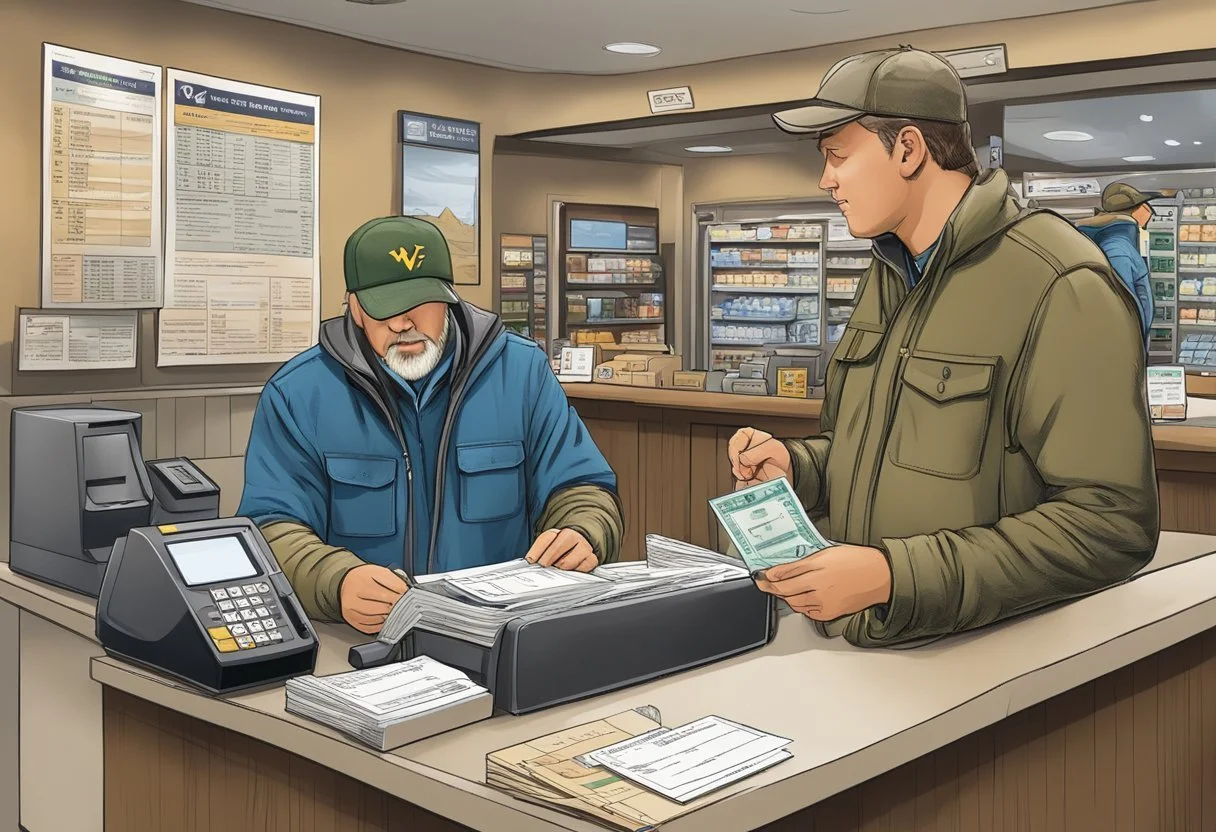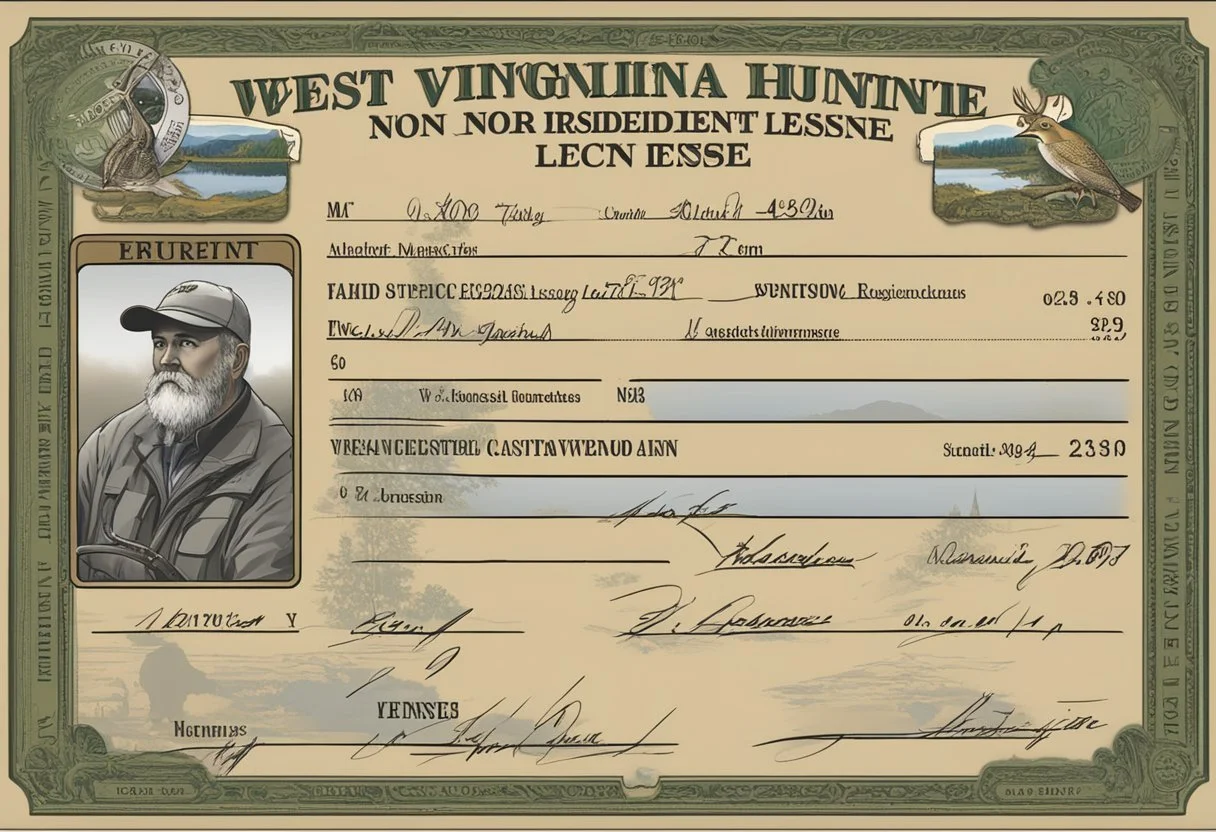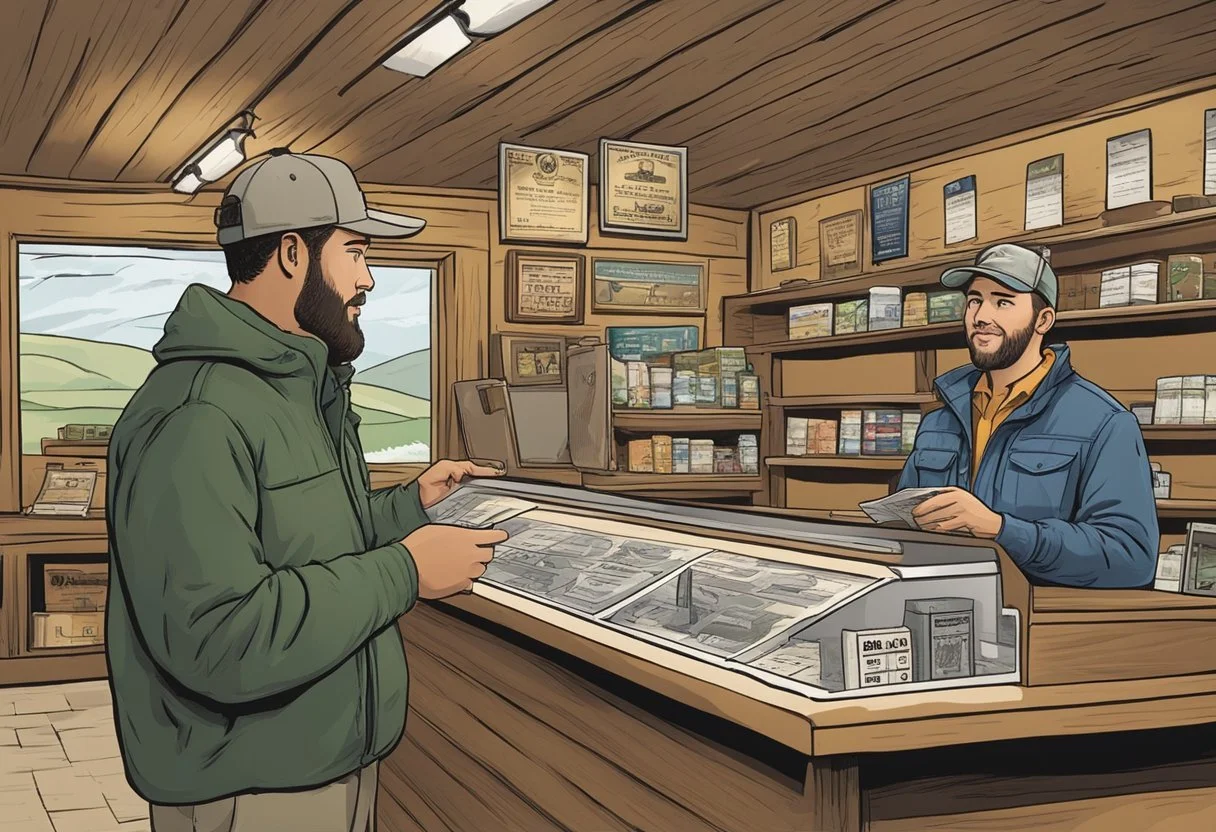How to Get a West Virginia Non-Resident Hunting License
A Comprehensive Guide
This Article is Part of Our Guide to Non Resident Hunting Licenses by State
West Virginia offers diverse hunting opportunities for non-residents, allowing those from outside the state to participate in its storied hunting traditions. A non-resident hunting license in West Virginia is mandated for any hunter who does not reside in the state but wishes to engage in any hunting activity. These licenses cater to different hunting needs and are available for purchase online or at licensed West Virginia hunting outfitters.
The process of obtaining a non-resident hunting license in West Virginia is straightforward and requires the hunter to provide proof of completing a certified hunter education course if born on or after January 1, 1975. The standard non-resident hunting license permits the holder to take two deer, either sex, during the firearms season. Additional stamps or permits may be required for hunting other game species or employing different hunting methods such as archery.
The cost structure for these licenses is designed to be accessible, with the base fee for a non-resident hunting license starting at $19.50. It is important for non-residents to familiarize themselves with West Virginia's hunting regulations, as these govern not only the hunting seasons and bag limits but also ensure the safety and preservation of wildlife populations across the state. Staying informed of regulations and adhering to them is crucial for a legal and ethical hunting experience in West Virginia.
Eligibility and Requirements for Non-Residents
Non-resident hunters seeking to hunt in West Virginia must meet stringent criteria and provide necessary documentation. The state sets clear regulations to ensure legal and ethical hunting practices are followed.
Basic Eligibility Criteria
Nonresident: Any person who does not reside in West Virginia is considered a nonresident and must obtain the appropriate nonresident hunting license.
Under the Age of 15: Non-resident juniors under 15 may hunt or trap without a license but must be accompanied by a licensed adult.
Nonresident Junior Sportsman License: Young nonresidents may be eligible for a junior sportsman license, which often has reduced fees compared to standard nonresident licenses.
Handicapped Nonresident Hunter: Specific licenses or permits may be available for nonresident hunters with handicaps, potentially with altered requirements.
Military License: Members of the military who are not residents may have special considerations for licensing.
Documentation and Photo ID Requirements
Non-residents must present the following when applying for a hunting license:
Photo ID Card: A current and valid government-issued photo identification is required.
Law Enforcement Database Check: An individual's information could be verified against law enforcement databases to ensure compliance with hunting regulations.
Types of Non-Resident Licenses
For nonresidents interested in hunting or trapping in West Virginia, understanding the variety of available licenses is crucial. These licenses are essential for compliance with state regulations and vary based on the game being hunted and the method used.
General Hunting and Trapping Licenses
Non-residents must acquire the appropriate hunting or trapping licenses before pursuing game in West Virginia. A general Nonresident Hunting License (Class E) lets individuals hunt in West Virginia, but certain game requires additional stamps or permits. Nonresidents under the age of 18 may be eligible for a Junior Sportsman Hunting/Trapping/Fishing License (Class XS), which provides similar privileges as the standard nonresident license at a reduced cost. For those who have never had a license, the Apprentice Hunting and Trapping License (Class AHJ) is available. Non-residents who prefer a lifetime of hunting in West Virginia can opt for a Lifetime License (Class N or NN) for hunting or trapping/fishing respectively.
Specialized Game Permits
To hunt specific game, non-residents must purchase specialized stamps or permits in addition to a general hunting license.
Bear: A Nonresident Bear Hunting License (Class EE) is required for hunting bear, along with a Bear Damage Stamp (DS) and a Conservation/Law Enforcement Stamp.
Archery: For deer hunting with a bow, a Class UU stamp is necessary.
Muzzleloader: Hunters using a muzzleloader for deer require a Class VV stamp.
Waterfowl: (Class RW) for migrants and waterfowl, a Federal Duck Stamp is also often required.
Turkey: For turkey hunting, a Class WW stamp must be obtained.
For seniors, there is a separate category of licenses, including the Senior Hunting/Trapping/Fishing License (Class XS). These specialized game permits ensure targeted management and conservation efforts for various wildlife species across the state.
License Costs and Payment Methods
To hunt in West Virginia as a non-resident, individuals must be aware of the distinct fee structures for various types of game and the available methods of payment for securing the necessary licenses and stamps.
Fee Structures and Rates
Conservation Stamp (Class CS/LE): The purchase of a Conservation Stamp is crucial for all hunters, costing $12. This stamp is foundational for all hunting activities within the state.
Non-resident Hunting License: A basic hunting license is mandatory, without which hunters cannot seek additional permits.
Antlerless Deer Hunt: Non-residents can obtain an Antlerless Deer Hunting Stamp to target does, which is a separate fee in addition to their standard license.
Additional Deer: For those interested in harvesting more than one buck, Additional Archery Deer Hunting Stamps may be purchased.
Buck Permit: Buck permits come with their own set rate and allow hunters to participate in the season for male deer.
Federal Migratory Waterfowl Stamp: Hunters interested in waterfowl must also procure a Federal Migratory Waterfowl Stamp.
HIP Card: Migratory game bird hunters are required to have a HIP (Harvest Information Program) Card, which is often free but must be carried alongside other licenses.
Please note: Fees mentioned above are subject to change and should be verified with West Virginia's Department of Natural Resources or official hunting guides.
Available Payment Options
To accommodate hunters, West Virginia provides multiple channels to pay for and obtain the necessary licenses and stamps, ensuring a quick and convenient transaction. Hunters can choose between the following:
Online Purchases: The official DNR website allows for transactions with a nominal online processing fee.
Phone Orders: By calling the Hunting and Fishing License Unit, one can complete the purchase over the phone, also with an additional fee.
Physical Outlets: Licenses may also be bought in person from authorized license agents throughout the state.
It's recommended to plan ahead and secure all necessary documentation before the season starts to avoid any potential issues.
Hunting Seasons and Legal Game
West Virginia offers a structured variety of hunting seasons throughout the calendar year. Each period is carefully regulated to maintain balance in wildlife populations and provide hunters ample opportunity.
Seasonal Hunting Periods
West Virginia's hunting seasons are separated into several distinct periods, each designated for specific types of game and methods of hunting. Firearms Season for deer typically begins in late November and extends through December, providing opportunities for those using traditional rifles. Muzzleloader Season, scheduled after Firearms Season, encourages hunters to use muzzleloading weapons for deer hunting.
For Archery and Crossbow enthusiasts, a lengthy season spans from September to December, and again in January for select counties, allowing both archery and crossbow hunters to pursue deer, bear, and other game. The state further offers specialized seasons, such as Youth Spring Turkey Season catering to young hunters, and Special Split Youth seasons, providing additional hunting days for youth and class Q/QQ hunters.
Moreover, Waterfowl seasons are usually aligned with migratory patterns and federal regulations, occurring mainly in the fall and winter months. It is important to check the specific dates annually as they can vary based on ecological studies and population counts.
Permitted Game and Bag Limits
Per West Virginia regulations, a variety of game species are available to hunters, each with its own set of bag limits to ensure sustainable populations:
Deer Seasons: Spanning across various hunting methods, the state offers separate seasons for Buck, Antlerless Deer, and a combined season. Each county, such as Marion County, may have differing bag limits and additional restrictions.
Turkey: Spring and fall seasons are available with county-specific bag limits. The Youth Spring Turkey Season provides a chance for young hunters to participate before the regular opening.
Bear Seasons: Hunting is generally divided into dates for archery and firearms, with a required Bear Damage Stamp in certain instances. Check the specific county regulations for open seasons.
Avid outdoorsmen must adhere to the established bag limits and season dates, often presented in a detailed format within the official state regulations or via the Electronic Licensing & Game Check System where licenses can be purchased and game checks reported. It's essential to review the West Virginia Division of Natural Resources for the most current season dates and regulations before planning a hunt.
Application Process and Purchase Locations
Securing a non-resident hunting license in West Virginia involves a direct and clearly outlined process. Non-residents can conveniently apply online or visit various retail and county clerk outlets to purchase the necessary licenses and permits.
Online Application System
The West Virginia Division of Natural Resources facilitates an Online Application System through WVhunt.com, where non-residents can apply for and purchase hunting licenses. The process on this platform is straightforward:
Navigate to WVhunt.com.
Create an account or log in to an existing one.
Select 'Purchase a License, Tag, or Permit.'
Add the required licenses, stamps, and permits to the cart.
Complete any necessary surveys and accept terms.
Proceed to Payment.
Enter payment details on the secure payment screen.
Print the license immediately after purchase.
Retail and County Clerk Outlets
Apart from the online system, non-residents can also visit Retail Agent Locations or County Clerks Offices to apply for and obtain hunting licenses. These locations include various retailers authorized by the Hunting and Fishing License Unit of the West Virginia Division of Natural Resources. Applicants can follow these steps:
Locate a nearby Retail Agent Location or County Clerk Office.
Provide necessary identification and documentation.
Choose the appropriate hunting license, stamps, and permits.
Complete the transaction and receive a printed copy of the license.
By offering both online and in-person application avenues, West Virginia ensures that non-residents have multiple convenient options for purchasing the required hunting licenses.
Additional Stamps and Permits
When purchasing non-resident hunting licenses in West Virginia, hunters are required to obtain certain stamps and permits for different hunting activities and species, particularly when seeking to hunt bear or deer, or when hunting on national forest lands.
Stamp and Permit Overview
In West Virginia, non-resident hunters need to be aware that there are specific stamps and permits that must accompany their base hunting license to legally hunt particular game or in certain areas. For example, in addition to a base hunting license, a nonresident who intends to hunt bear must acquire a Bear Damage Stamp and a Conservation/Law Enforcement Stamp. For those hunting deer, an Antlerless Deer Hunting Stamp may be required. Likewise, those hunting on National Forest lands need a specific stamp as well.
Conservation/Law Enforcement Stamp: Mandatory for bear hunting, priced at $13.
Bear Damage Stamp: Also required for hunting bear, priced at $10.
Antlerless Deer Hunting Stamp: Necessary for hunting antlerless deer.
Class I Stamp: This $2 stamp is for hunting in National Forest areas.
It should be noted that these stamps should be acquired prior to the hunting season commencement to avoid any legal issues.
Unique Stamps and Additional Permissions
The West Virginia Division of Natural Resources stipulates additional permissions and stamps for nonresident hunters. Some of these include:
Waterfowl Stamp: Required for hunting waterfowl species.
Federal Duck Stamp: A federal requirement for waterfowl hunters, which is in addition to the state's waterfowl stamp.
Field Tag: Upon harvesting game, the hunter must complete a field tag before moving the carcass.
Game Tag Number: Each harvest must be reported with a unique game tag number, which can be obtained upon the purchase of a license.
For hunters with disabilities, the Class Q Hunting Permit provides special accommodations and may also necessitate additional stamps, depending on the game being hunted.
Lastly, while nonresident hunters are primarily concerned with hunting licenses, it is worth mentioning that some may also opt to engage in fishing, requiring them to purchase a Fishing License. All hunters and anglers must comply with regulations set forth by the West Virginia Division of Natural Resources to ensure conservation efforts and responsible wildlife management.
Hunting Regulations and Compliance
In West Virginia, non-resident hunters must adhere to specific regulations and conservation rules to ensure a safe and legal hunting experience.
General Guidelines and Restrictions
Non-resident hunters in West Virginia are required to purchase the appropriate licenses and stamps before engaging in hunting activities. Regulations vary depending on the game and season. For firearms season, non-residents need a hunting license which allows taking two deer. For bear hunting, a Class EE non-resident bear hunting license, a Bear Damage Stamp DS, and a Conservation/Law Enforcement Stamp are necessary. Hunting in limited wildlife management areas and National Forests may require additional permits such as the Class I stamp for National Forests.
Hunters are also expected to carry their licenses and game tags at all times. Proper field tagging of game is mandatory immediately after the harvest. The use of various hunting methods such as archery, firearms, and muzzleloading is regulated, and hunters should check for specific season dates and guidelines that apply to each method.
Wildlife Management and Conservation Rules
Conservation efforts are at the forefront of West Virginia's hunting regulations to ensure sustainable wildlife populations. The Conservation Stamp, mandatory for all hunters, supports these initiatives. In addition, some areas may be designated as Class NN, which denotes Limited Wildlife Management Areas with additional rules to protect local ecosystems.
Compliance with the Harvest Information Program (HIP) is also required for those hunting migratory game birds. This program helps in managing wildlife populations and setting appropriate hunting regulations. When hunting on National Wildlife Refuges, a free refuge hunting permit must be obtained, and hunters must follow specific local rules. Non-residents should familiarize themselves with restrictions that apply to certain species and habitats, ensuring their hunting practices support wildlife management and conservation efforts.
Hunter Education and Safety
Non-resident hunters in West Virginia must adhere to specific education and safety regulations to promote a responsible hunting practice within the state.
Mandatory Hunter Education Courses
Non-residents born on or after January 1, 1975, are required to successfully complete a Certified Hunter Education Course prior to purchasing a base hunting license. This course must cover essential hunting knowledge including, but not limited to, the use of various weapons such as archery, crossbow, muzzleloader, and handgun. Upon completion, they must present a certificate as proof to the agent issuing the license.
Hunting Safety Guidelines and Best Practices
Hunters are expected to follow stringent safety guidelines to ensure the welfare of both themselves and the wildlife. Key principles include:
Identification: Always positively identify your target before aiming.
Weapon Handling: Handle all hunting weapons with care; always assume a weapon is loaded.
Law Enforcement: Comply with all regulations enforced by the local law enforcement agencies, including carrying the HIP Card for migratory game bird hunting.
Environment: Respect the natural habitat by minimizing disturbances and following conservation practices.
By maintaining these standards, hunters contribute to a safer and more sustainable hunting environment in West Virginia.
Residency Status and Reciprocal Agreements
Hunting regulations in West Virginia differentiate between residents and nonresidents while recognizing special agreements with neighboring states. Understanding how residency is determined and how these agreements affect licensing is crucial for prospective hunters.
Determining Residency for Licensing
Residency status is paramount when purchasing a hunting license in West Virginia. The West Virginia Division of Natural Resources (WVDNR) mandates that anyone classified as a nonresident must possess a valid hunting license from their home state before they can obtain a West Virginian nonresident license. For residents, the criteria include being domiciled within West Virginia for a consecutive 30 days before applying for the license.
Residents can enjoy reduced license fees and the privilege to apply for Resident Landowner licenses, granted they meet specific landownership criteria.
Active-Duty Military Members stationed in West Virginia who are not residents are eligible for resident licensing rates.
Interstate Agreements and Considerations
West Virginia has entered into reciprocal agreements impacting nonresident license criteria and fees. For example, bordering states, such as Ohio and Pennsylvania (PA), may have specific reciprocal privileges allowing for certain exemptions or modifications in license requirements for nonresidents.
Nonresident Licenses: Hunters from states like Ohio and Pennsylvania must verify their eligibility under these agreements when purchasing licenses.
Reciprocal Hunting Rights: Nonresidents owning property in West Virginia might be eligible for Resident Licenses due to reciprocal agreements, especially relevant to landowners from Ohio and PA.
It is essential for nonresidents and residents alike to familiarize themselves with these regulations to ensure compliance and to take full advantage of any reciprocal benefits.
Special Considerations and Exemptions
In West Virginia, non-resident hunters must navigate a series of special considerations and exemptions related to age, military service, and disability. Understanding these intricacies can ensure compliance with state regulations and potentially provide benefits that ease the licensing process.
Youth, Senior, and Disability Provisions
Youth Hunter Specifications: Non-resident hunters under the age of 15 are not subject to the standard licensing requirements; however, they must be accompanied by a licensed adult and adhere to bag limits and season dates. During the Youth Spring Turkey Season, minors can gain early exposure to turkey hunting, an initiative that underscores West Virginia's commitment to fostering the next generation of hunters.
Senior and Disability Exemptions: Hunters who are 65 years of age or older, as well as those with a disability, may apply for the Senior Lifetime License or Senior Hunting/Trapping/Fishing License. This offers a simplified option for seniors to enjoy the hunting privileges without annual renewals. For non-resident hunters with disabilities, a special consideration is the availability of a Handicapped Nonresident Hunter license, which complies with West Virginia's regulations and eases the hunting experience.
Active Military and Veteran Benefits
Military License Opportunities: Active military members and veterans are recognized with specific licensing benefits. Those stationed in West Virginia and veterans who can provide proof of their service may be eligible for a Military License. This recognition goes hand in hand with West Virginia's respect for servicemen and servicewomen, offering them certain privileges in hunting licensure.
Concealed Carry Considerations: Military personnel, both resident and non-resident, who are also concealed weapons permit holders, can leverage this permit when applying for their hunting license, possibly exempting them from some parts of the application process due to pre-existing background checks associated with the Concealed Weapons Permit.
These categories and exemptions are designed to cater to specific groups, providing a customized approach to wildlife conservation and hunting regulations that encourage broad participation while respecting individual circumstances.
Additional Resources and Support
When seeking additional information or support regarding West Virginia non-resident hunting licenses, individuals can turn to the West Virginia Division of Natural Resources and its dedicated branches for assistance. These resources offer support for both potential violations and general inquiries.
Customer Service and Information
The West Virginia Division of Natural Resources (DNR) provides extensive customer service and information. Nonresidents can contact the DNR's Hunting and Fishing License Unit for detailed assistance with licensing requirements and hunting regulations. A valuable resource for this information is the official website, WVhunt.com, where one can find details about the hunting season, specific regulations for hunting in a National Forest, and purchase licenses online.
Contact Information for Customer Service:
Phone: Provided on the WVhunt.com or DNR's official website
Email: Specific email addresses for queries can be found on the website
Walk-in: For in-person assistance, individuals can visit local DNR offices.
Violation Reporting and Enforcement
The DNR emphasizes the importance of adhering to hunting regulations and has established protocols for reporting violations. Individuals can report potential violations directly to the DNR's Law Enforcement section. The DNR's conservation officers are responsible for the enforcement of wildlife laws, and they work in collaboration with agencies such as the Pennsylvania Game Commission (PA) when matters cross state lines.
How to Report a Violation:
Hotline: A designated number for reporting violations is available on the DNR website.
Online: There may be an online reporting system available via the DNR or WVhunt.com.
These resources are designed to help ensure that nonresident hunters have the information needed for a legal and ethical hunting experience in West Virginia, protecting the state's natural resources and fostering a respectful hunting community.
#WestVirginiaHuntingLicense #NonResidentHunting #OutofStateHunting #HuntingPermits #WildlifeConservation #OutdoorAdventures #HuntingRegulations






